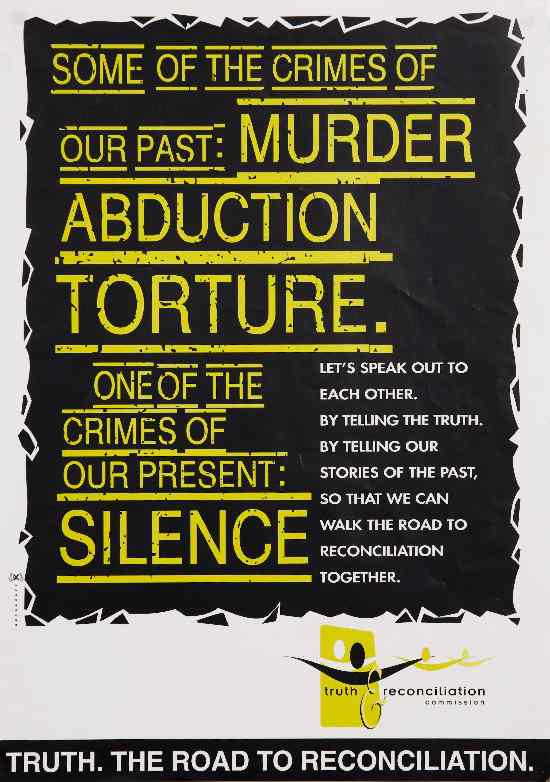 SAHA is currently engaged in a protracted battle with the Department of Justice and Constitutional Development (DOJCD), to gain access to an anonymised copy of the TRC Victims Database.
SAHA is currently engaged in a protracted battle with the Department of Justice and Constitutional Development (DOJCD), to gain access to an anonymised copy of the TRC Victims Database.
This database of human rights violations under apartheid compiled in the course of the Truth and Reconciliation Commission (TRC):
"represents one of the most remarkable archival collections in the country and belongs to the nation".
In order to build on the initial work of the South African TRC through further research and analysis, SAHA hopes to be able to make this database more widely accessible by publishing it online, as has been the practice of a number of other truth commissions around the world.
SAHA first submitted a request for access to the database in terms of the Promotion of Access to Information Act (PAIA) back in 2006. In response to this initial request, the DOJCD sent correspondence to 22,000 South Africans whose personal information is stored in the database, erroneously claiming that SAHA had requested access to specific personal data, despite SAHA expressly stating that it did not want access to this personal data. SAHA's PAIA request was refused on grounds of privacy, demonstrating the DOJCD's basic lack of understanding of the PAIA request process, which is particularly worrying given that the DOJCD is supposed to be the state's lead agency in the implementation of this key piece of constitutional legislation.
In March 2009, SAHA re-submitted the request once more stating clearly that SAHA did not want access to victims' names, addresses and other identifying data. This request was also initially refused but, in response to SAHA's appeal in June 2013, the incoming Minister of Justice, Jeffrey Radebe, eventually overturned previous refusals and instructed a copy of the TRC database to be released to SAHA in September 2009.
After a long history of battles with DOJCD to obtain access to TRC records, SAHA had hoped that this decision by Minister Radebe represented a changing attitude to the right to access to information within DOJCD. However, in contravention of the Minister's instructions, the PAIA Unit of the DOJCD has failed, over three years later, to provide SAHA with a usable copy of the database.
The excuse most commonly proffered by the DOJCD for this failure, has been ‘technical difficulties' in redacting personal information from the database. SAHA, however, has secured written offers from experts involved in the design of the database to work with the DOJCD to undertake this apparently simple process. These offers have been repeatedly communicated to, and ignored by, the DOJCD. The department finally wrote to SAHA in 2012 alleging, in contradiction to all evidence to the contrary that the copy of the database provided complies with the Minister's instruction to avail the database to SAHA, that there is no additional information that can be provided, and they considered the case to be closed.
The TRC Victims Database represents an important part of South Africa's history, and it is saddening to witness both the lack of care demonstrated by the department in ensuring the preservation and accessibility of records in the DOJCD's custody and the persistent lack of will to cooperate fully with SAHA and to comply with their obligations to release the database in terms of PAIA.
SAHA's position remains that the PAIA request was granted in full by the Minister and therefore the database must be provided in a workable format necessary for the purpose for which it was requested. Anything short of full compliance with the request is inadequate, particularly given the availability of technical experts ready and able to extract data in a workable format.
SAHA has once again appealed to the Minister, appealing for his intervention in order to reach an amicable solution rather than enter into litigation, asking for a response to this enquiry by 19 April 2013. Having received no acknowledgement of this request, SAHA is left with no choice but to pursue this issue through the courts.
As South Africa celebrates Freedom Day, this is simply one telling example of the on-going frustrations that come with attempting to secure records from public bodies. Given the historical failure of many government departments to comply with their existing statutory requirements in terms of PAIA, it seems clear that the Secrecy Bill passed by the National Assembly this week will only strengthen government's ability to obscure and obfuscate without check, thus further undermining and limiting the hard won right of freedom of information in South Africa.
For more information about SAHA's experiences attempting to access TRC records, please see:
Pigou, P. Accessing the Records of the Truth and Reconciliation Commission. In Allan, K (ed). 2009. Paper wars: access to information in South Africa.






 SAHA is currently engaged in a protracted battle with the Department of Justice and Constitutional Development (DOJCD), to g
SAHA is currently engaged in a protracted battle with the Department of Justice and Constitutional Development (DOJCD), to g